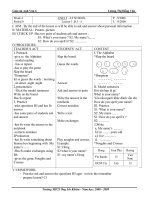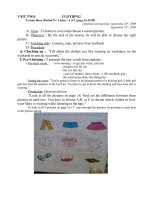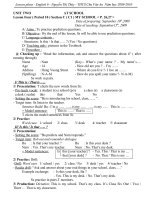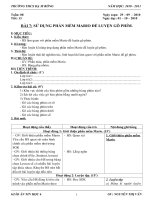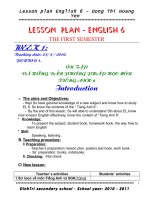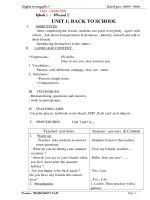GA Anh 6 tuan
Bạn đang xem bản rút gọn của tài liệu. Xem và tải ngay bản đầy đủ của tài liệu tại đây (80.21 KB, 5 trang )
<span class='text_page_counter'>(1)</span><div class='page_container' data-page=1>
Date of planning : 13/9/2012
Date of teaching : 17/9/2012
Unit 3: At home
Period 12 : Lesson 1: A1,2 : My house
A- The aims and objectives.
1. Aims : Help ss know about living room vocabulary.Use Wh- question with
These/Those.Develop speaking skill
2. Objectives: -By the end of the lesson, students will be able to ask and answer
about things in the house.
3.Teaching points:
What are these ? They are books
What are those ?
B-Preparation:
+T: picture, poster
+Ss: Textbook, pens, pencils
C - Procedures .
1- Organization.(1’)
-Good morning! How are you today? Who’s absent today?
2 - Checking up/Warm up: (5’) - Write the vocabulary
- Write question and answer :
a. What/ this? - an eraser ; What is this ? It’s an eraser
b. What/ that ? - a book ; What is that ? It’s a book
- Call 2 students.
- Correct and give mark.
3 . New lesson
T’s activities T Ss’ activities
1. Pre teach: Vocabulary
A lamp : đèn
A bookshelf : giá sách
A chair : ghế tựa
A couch : ghế sa lông dài
An armchair : ghÕ bµnh
A table : cái bàn
A telephone : điện thoại
A living room : phòng khách
* Checking: Slap the board
2. Presentation: A2 p31
- Set the scene:
Nam Ba
- Revise:
What's this? - It's a table
that ? an armchair
- Elicit: Muốn biết tên từ 2 đồ vật trở lên, hỏi ntn?
- Model:
What are these? - They are tables
those ? ( They're erasers )
Dialogue build: R & R
Concept checking:
- Meaning: Những cái gì đây/ kia?
-Chóng lµ những cái
- Form: bby
6
3
10
'
- Guess the words
- Repeat chorally
- Repeat individually
- Copy
- Play in 2 teams
Each team has 3 SS
- Have a look
- Chorus repetition
- Individual repetition
- 2 groups work
- Open/ closed pairs
- Pairs work
- Translate
- Put form
<b>20</b>
<b>A book shelf</b>
<b>A lamp</b>
<b>A </b>
<b>couch</b>
<b>An </b>
<b>armchair</b> <b>The living-room</b>
</div>
<span class='text_page_counter'>(2)</span><div class='page_container' data-page=2>
- Use: Hỏi , trả lời về tên nhiều đồ vật ở khoảng
cách gần/ xa là gì.
* (These/ those là chỉ định đại từ số nhiều của
this/ that dùng làm chủ ngữ chỉ nhiều ngời hay vật
ở khoảng cách gần/ xa.)
Danh tõ sè Ýt - danh tõ sè nhiÒu
A book books
An armchair armchairs …
- Intonation : falling tone
3. Practice: Picture drill (A2p31)
- Ask students to go through things in the picture.
Practice by asking and answering:
T: What's this? Ss: It's a TV
What are these/ those? They are armchairs
- Control
- Less controlled
4. Further practice
- Ask students to work in pairs: Ask and answer
about things in the classroom.
S1: What's that? S2: It's a door
S1: What are these? S2: They are desks.
- Time (3')
- Feed back: Call some students to practice aloud
- Ask students to write 4 questions and answers
using these/ those.
- Indirect correction.
10
'
5'
- Give the use
- Put e.g.
- Go through
- Chorus repetition
- 2 groups work
- Open/ closed pairs
- Pairs work
- Pairs work
Individually work
4 - Consolidation.(2’) : Retell the main point of the lesson.
5 - Homework.(3’) - Learn by heart the vocabulary ,
- Ex1,2 (p17,18)
……….
Date of planning :15/9/2012
Date of teaching :18/9/2012
Unit 3: At home
Period 13 : Lesson 2: A3, 4,5*
A- The aims and objectives.
1- Aims : -Studying family vocabulary , possessive pronoun. Practice in listening
and
speaking skill .
2- Objectives: By the end of the lesson, students will be able to use possessive
pronoun:
my, her his, your and Who-question to talk about family members.
3-Teaching points: Possessive pronoun and 'Who's this/ That?' questions.
B-Preparation
+T: poster, cards, pictures.
+Ss: Texxtbooks
C - Procedures.
1- Organization.(1’)
-Good morning! How are you today? Who’s absent today?
2 - Checking up/Warm up: (5’) - Write the vocabulary
- Write questions and answers with 'these/
those'
What are these / those ? They are + Ns
- Call 2 students.
- Correct and give mark.
3- New lesson.
T’s activities T Ss’ activities
1. Pre teach: Vocabulary
family (n) : gia đình 8 - Guess the words
<b>21</b>
</div>
<span class='text_page_counter'>(3)</span><div class='page_container' data-page=3>
father (n) : bè, cha
mother (n) : mÑ
brother (n) : anh, em trai
sister (n) : chị, em gái
your (a) : của (bạn/ các bạn)
his (a) : cña (anh/ «ng Êy)
her (a) : của (cô, chị ấy)
their (a) : cña hä
* Checking: What & Where
2. Presentation: A3 p32
- Set the scene: Ba - a student
Ba is talking about his family
* How many people are there in his family?
- Model A3, ask students to repeat.
- Call 2 students to read aloud
- Ask students to answer the pre - question.
Key: There are 4 people in his family.
- Ask students to read A3 again and complete
the "Grid''
Name Relative Age Job
Ba
Nga
Ha
Lan
<i>Brother</i>
<i>Mother</i>
<i>Father</i>
<i>sister</i>
<i>12</i>
<i>15</i>
<i>A student</i>
<i>A teacher</i>
<i>A teacher</i>
<i>A student</i>
- Get feed back: Correct
* Model sentence:
Nga Lan
Who is that? It's his brother
What's her name? Her name's Nga.
- Form: Who is this / that ?
It is + tªn/ mèi quan hệ
* Concept checking:
- Use: Hỏi, trả lời tên ngời,
hay xác định ngời ở gần/ xa.
- Meaning: Đây/ kia là ai?
- Intonation : falling tone
3. Practice A4 : Word cues drill
- Control
- Less controlled: Ask students to practice in
pairs:
T : Who's this/ that?
Ss: It's his mother/ father/ sister.
T : What's his/ her name?
Ss: His/ her name is Nga …
- Feed back: Indirect correction
4. Production: Describe and Draw
- Ask students to draw their family (2')
- Ask students to work in pairs: Ask and answer
about your partner's family. (3')
- Model:
Hung (40) Mai (35) Chi (10)
S1: Who's this? S2: It's my father
15
8
5
- Repeat chorally
- Repeat individually
- Copy
Copy down
- Have a look
- Whole class
- 2 students
- Answer
- Individual work
- Compare
- Remark
- Have a look
- Chorus repetition
- Individual repetition
- 2 groups work
- Open/ closed pairs
- Pairs work
- Translate
- Put form
- Give the use
- Put e.g.
- Go through
- Chorus repetition
- 2 groups work
- Open/ closed pairs
- Pairs work
- Individual work
- Pairs work
<b>Nga</b>
<b>(35)</b> <b>(40)Ha</b> <b>Lan(15)</b>
</div>
<span class='text_page_counter'>(4)</span><div class='page_container' data-page=4>
S1: What's his name? S2: His name's Hung
S1: How old is he? S2: He's 40
S1: How many people are there in your family?
S2: There are ….
- Pairs work
4- 4. Consolidation.(1’)
- Retell the main point of the lesson
5 - Homework.(2’)
- Learn by heart the vocabulary, form
- Learn by heart the form: 'Who's this/ That? It’s….
- Ex2, 3 (p18/19)
Date of planning :17/9/2012
Date of teaching : 20/9/2012
Unit 3: At home
Period 14 : Lesson 3: B1,2 Numbers
A- The aims and objectives.
1- Aims : Practice in listening and speaking skill to say numbers from 21 - 100
2- Objectives: -By the end of the lesson, students will be able to count numbers
from
21 - 100, pronunciation of plural nouns: /s/ ;/z/ ;/iz/ to count things in the class.
3. Teaching point : - Numbers from 21 to 100
- There is…../ There are……
B. Preparation: +T: poster, pictures.
+Ss: Texxtbooks
C - Procedures.
1- Organization.(1’)
-Good morning! How are you today? Who’s absent today?
2 - Checking up/Warm up: (5 ’) - Write the vocabulary
- Introduce your members in your family.
- Do Ex2, 3 (p18/19)
- Call 2 students.
- Correct and give mark.
3 - New lesson.
T’s activities T Ss’ activities
1. Pre teach: Vocabulary
a bench/ benches : ghÕ dµi
a stool : ghÕ ®Èu
twenty-one : 21 sixty : 60
thirty : 30 seventy : 70
forty : 40 eighty : 80
fifty : 50 ninety : 90
fifty-fif : 55 one hundred :100
* Checking: Wh & Wh
2. Singular Noun and Flural Noun.
- Set the scene:
1 door - 2 doors
1 bench - 3 benches
a city - 2 cities
1 box - 2 boxes
Form: N + s/ es => Ns/es
(danh tõ sè Ýt danh tõ sè nhiÒu)
3. Practice: B1,2 (p36)
- Ask students to listen and repeat B1
- Call students to read numbers aloud
8
5
12
- Guess the words
- Repeat chorally
- Repeat individually
- Copy down
- Work in 2 groups
Read again
Take notes
- Whole class
- Individual work
<b>26</b>
<b>40</b> <b>20</b>
<b>90</b>
<b>60</b> <b>100</b>
</div>
<span class='text_page_counter'>(5)</span><div class='page_container' data-page=5>
- Ask students to look at the picture B2
- Ask students to count the items in the
classroom
- Model:
1 door 1 window 1 table
2 students 1 clock 1 board
1 book 1 ruler 1 eraser
- Call some students to count again
- Ask students to count real things in the class.
- Feed back: Call some students to say aloud
4. Further practice: Dictation list
- Explain: How to pronoun the flural s/es:
Đọc Sau các chữ ví dô
s - /s/
es - /iz/
s - /z/
k, f, p ,t
ces, ches, shes,
xes, zes, ges, ses
ngoài 2 cách trªn
Books
Benches
Houses
doors
- Ask students to write words in their
pronunciation column.
- Read: desks, rulers, benches, students , tables,
books, clocks, couches, doors, windows,
houses, lamps.
- Feed back: Call students to list
/s/ /z/ /iz/
Desks
Students
Books
Clocks
lamps
Rulers
Tables
Doors
windows
Benches
Couches
houses
- Indirect correction.
-Ask students to write 5 singular N and flural N
- Feed back: Correct
7
- Have a look
- Whole class
- Individual work
- Practice
- Read
- Whole class
- Individual work
- Compare
4 - Consolidation.(2’) : Retell the main point of the lesson.
5- Homework (2’) :
</div>
<!--links-->

